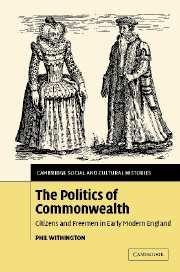Book contents
- Frontmatter
- Contents
- List of figures
- List of tables
- Acknowledgements
- Part I Introductions
- Part II Cultural resources: ideology, place, company
- 3 Citizens and subjects
- 4 Placing the city commonwealth
- 5 Civic conversations
- Part III Honest distinctions: economy, patriarchy, religion
- Conclusion
- Bibliography
- Index
4 - Placing the city commonwealth
Published online by Cambridge University Press: 23 December 2009
- Frontmatter
- Contents
- List of figures
- List of tables
- Acknowledgements
- Part I Introductions
- Part II Cultural resources: ideology, place, company
- 3 Citizens and subjects
- 4 Placing the city commonwealth
- 5 Civic conversations
- Part III Honest distinctions: economy, patriarchy, religion
- Conclusion
- Bibliography
- Index
Summary
‘Fixed upon the surface of the Earth’
Robert Brady was no admirer of citizens and the ‘Absurd Rights’ they claimed. In 1690 he mocked ‘the creation, and so many ready wrought, and framed, small commonwealths, lifted out of the chaos, and fixed upon the surface of the Earth, with their Walls, Gates, Town and Gild-Halls, Courts, Liberties, Customs, Privileges, Freedom, Jurisdictions, Magistrates and Officers, and Absolute Powers’. Deploying his considerable antiquarian skills, Brady demonstrated that cities and boroughs were not ‘Eternal, appearing fully formed from heaven’, but the product of grants and charters from ‘our Ancient Kings, and their Successors’ over time. Self-consciously empirical, his treatise was nevertheless clearly weighted against both an expansive notion of civitas and a democratic conception of the ‘ancient constitution’. Coming so soon after the recent and wholesale assault on chartered privileges by ‘Tory’ gentlemen and the crown, it was a text both deeply partisan and strongly supportive of the monarchical state. It nevertheless echoes some of the central contentions of the previous chapters. First, that Brady wrote his treatise at all was testimony to the fact that, as late as 1690, city or ‘small commonwealths’ remained a constitutive feature of early modern political culture. Second, the riddle that city commonwealths posed for the later Stuarts reflected at once the convergence of ideas and interests that had informed their creation, and the subsequent fragmentation of those ideas and interests after 1640.
- Type
- Chapter
- Information
- The Politics of CommonwealthCitizens and Freemen in Early Modern England, pp. 85 - 123Publisher: Cambridge University PressPrint publication year: 2005

